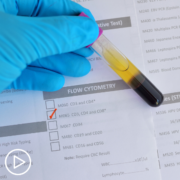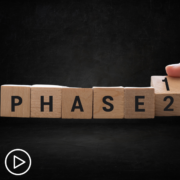How Can Patients Learn About Developing CLL Research?
How Can Patients Learn About Developing CLL Research? from Patient Empowerment Network on Vimeo.
Dr. Danielle Brander explains why it’s important for chronic lymphocytic leukemia (CLL) patients to stay up-to-date on developing research and treatment news. Dr. Brander also shares resources for learning more about clinical studies.
Dr. Danielle Brander is Director of the CLL and Lymphoma Clinical Research Program at Duke Cancer Institute. Learn more about Dr. Brander here.
See More From the Path to CLL Empowerment
Related Programs

CLL Genetic Tests: How Do Results Impact Treatment and Care? |

|

|
Transcript:
Dr. Brander:
I think it’s very important that patients and their caregivers stay informed and advised of opportunities to participate in ongoing research. I think there’s a misconception that with all the favorable progress in treatment options available for CLL, that there’s no longer the need for clinical research participation.
Though, there are a lot of novel options available for CLL, there’s still a lot of ways that we can improve care for patients. That is, there are trials with the next-generation inhibitors or for patients traditionally with harder to treat CLL or may become resistant to the novel agents, there’s a lot of trials looking into how do you combine the novel agents to give patients the best options. And then a lot of the research, too, are not just in the treatments.
But as our science advances into looking at other markers of the CLL cells, or what we call the depth of response, how much CLL you kill with the treatments and how low of a level we can get in terms of detection. This may result in a situation where patients have the opportunity to receive novel treatments, have a really good response, and then potentially stop the treatments and be followed off of therapies, so have the benefit of novel treatment but not with having to go on an ongoing drug forever and ever.
When I talk to a patient about opportunities for clinical trials, I’m really focused on the patient in front of me. That is, I wouldn’t offer or talk about a trial if I didn’t think it potentially could benefit the patient in front of me.
And again, though we’ve had a lot of advances in treatment options, there are certainly a lot of ways that we can engage and hopefully help patients moving forward. There’s been recent studies across all cancers showing that unfortunately a very low percent of patients are offered and enrolled and participating in clinical research studies, and I think it’s really important that patients know there’s a lot of opportunities out there that potentially could benefit them.
The different ways to be advised and informed, again, are some of the resources online educationally for CLL and lymphoma that often post about different sites for clinical trials. There’s a clinical trials.gov web site that all sites in the United States that are enrolling trials with patients have to log clinical trials, and though that has to be updated, it often can be a good beginning site.
But in the end, hopefully the best resource is your treatment team, your oncologist, and your other team that can help point you to what trials might be eligible for you, either at the location where you are or close by.
The last part I’ll point out is though we focus a lot on the treatment clinical trials, in CLL, where patients don’t always need treatment right away or may have treatment and have a response and then have a long period of time afterward, is that many centers are helping to engage patients in research that is not necessarily done during the time of their treatment. Again, to try to understand why some patients have a longer course until they require treatment, or why they might have responded differently, or other ways we can improve their care.










